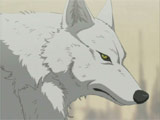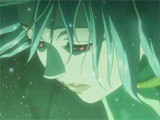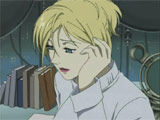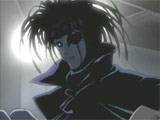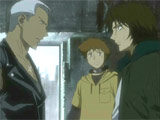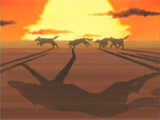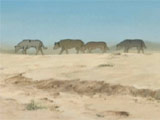

Quick Links:
Wolf's Rain
Wolf's Rain is a story of survival in a dying world. A deeply philosophical tale, it explores both our humanity and our animal qualities in a setting where one is often forced to choose between the two. As an anime, the series presents beautiful scenery and music, but doesn't manage its screen time as well as it could have. It offers little in the way of actual entertainment, though it does provide an abundance of food for thought, and some good drama on occasion.
The setting of Wolf's Rain is a near-lifeless planet, where most humans take shelter in enormous cities with dome-shaped ceilings. The cities are ruled over by a handful of feudal lords (nobles) that don't seem to like each other much. For its length, the series has a rather large cast of main characters: four wolves, a dog that's half wolf, a man with a wolf's eye, two men, a woman, and a flowering plant genetically modified to look like a girl. We are introduced to them all quickly to get things moving, but shortly thereafter, the pace of the series becomes lethargic.
The central character of the series is a white wolf named Kiba, who travels into one of the cities hot on the scent of a moon flower. That flower is the "flower girl" named Cheza, the last surviving moon flower. According to the lore of the series (laid out in the mystical "Book of the Moon"), the moon flower is the key to the door of paradise -- a door only the wolves can open. The series draws a natural affinity between wolves and moon flowers, both of which are nocturnal. (The flower blooms at dusk, and gives off a pleasant scent.) Kiba isn't the only one seeking Cheza, though. The man with a wolf's eye, Darcia, is also after her.
The series reveals paradise as a sort of return to natural order, which is one reason why only the wolves can go. The humans are painted as wolves who forgot what they are over time. For this reason, the wolves are able to hide their existence by appearing like humans, while the humans believe that wolves have been extinct for a couple hundred years. Much time is spent exploring the differences between wolf and human, though the human qualities of the wolves are more interesting than the flip side. In fact, the chief indicator of good and evil in the series is the level of humanity displayed by both wolf and human -- the nobles behaving more beastly than the "good-natured" wolves.
As the merging of wolf and human is an important theme in the series, much time is spent on the lives and motivations of each. On the human side we have Quent, a man out for revenge against all wolves after losing his family and village. Quent is somewhat a paradox; his hatred of wolves is in stark contrast to the fact that his dog, Blue, is part wolf. Blue is his only family, and he treats her as something precious. Blue keeps Quent human, in a way, because her presence quiets his rage.
The other two humans, Hubb and Cher, represent hope for the future, and what's important in life. The couple experienced a recent separation due to Cher's research on Cheza demanding much of her time, but they are thrown together again by circumstance. And it is circumstance that pushes them ever closer as the dangers surrounding them increase. Their devotion to each other underscores the fact that community is a basic human need, and for reasons other than mere survival. Having something to live for, in addition to having life.
The determination of the protagonists is tested on a regular basis, not only by the dangers of their quest, but the tragedies that befall them therein. The series has many deaths, most falling under the category of survival kills. They aren't very interesting — that is, the series doesn't give them much attention. One pivotal death is pure accident, a fall caused by movements of the volatile earth. The rest are murderous deaths; the result of a great enemy coming into view. As with any big moment in life, the characters are defined by what they do afterward. With each passing, the human and wolf qualities are brought closer together. The climax of the series is in the rhetorical sense a clash of man and beast — the notion being that the character of the wolf who opens paradise defines its nature — and the ending provides a clue as to the result.
All in all, the story is solid. Insofar as the characters representing human or animal traits, these are portrayed well. The story's creation myth is fascinating, because it has a tribal quality to it. These things speak of careful planning and meticulous attention to detail. What doesn't play out so well are the plot and dialogue, which are the result of careful planning and meticulous attention to detail. Careful plotting lacks mojo, so to speak. Though the issue has little effect on the intellectual merits of the series, it's a serious downer for the entertainment value. I did find things to relate to in the characters, but the only emotional bond I felt was with the couple, Hubb and Cher.
The audiovisual experience of Wolf's Rain goes a long way to alleviate this issue. The beauty of having a wasteland as a setting is the brilliance it lends to the living. In this way the characters of the series stand out, without appearing gaudy or fake. The character animation is also a quality product, adding lifelike motion to humans and animals alike. The real magic is in how it's all tied together: the balance of colors, the right contrast of light and dark, and Yoko Kanno's musical genius combine to form some truly beautiful moments. Whether caught in a trance by the smooth melody of Strangers while wolves race across a frozen wilderness, or captivated by lunar flowers in bloom with the excited orchestral backdrop of Rain of Blossoms, these scenes are an extraordinary pleasure to witness.
Though Wolf's Rain does offer some unforgettable moments, I would nonetheless advise discretion. The series is heavy in an emotional sense, having a measure of joy, but also a lot of sadness, loss, and despair — a fact that aspiring viewers should be mindful of. Some scenes can be difficult to cope with; however, I would say the experience of the series is a net positive. Though my primary interest in it is intellectual, I won't forget those few scenes where everything was right with the world of Wolf's Rain.

